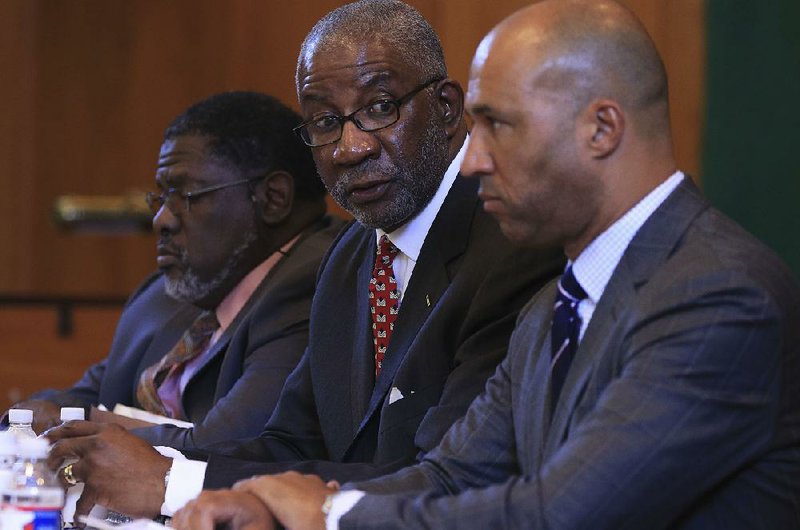Pulaski County Circuit Judge Wendell Griffen on Thursday filed a federal lawsuit against all seven members of the Arkansas Supreme Court, accusing them of violating state and federal laws by disqualifying him from presiding over any cases involving the death penalty or the state's execution protocol.
The court took the action on April 17, three days after Griffen, a Baptist minister, attended a prayer vigil outside the Governor's Mansion in Little Rock in opposition to executions while lying on a cot "in solidarity with Jesus."
Earlier that same day, Griffen issued an order that blocked the use of an execution drug and thereby halted the state's efforts to begin a series of executions. The temporary restraining order came in response to a lawsuit filed by the drug's manufacturer alleging that the state had obtained it only by intentionally failing to disclose that it would be used in the executions.
In the lawsuit, Griffen referred to the drug case as "a property law case."
He also said that "in his personal life and his capacity as a pastor," he has expressed his personal religious and moral views on the death penalty, and that he has participated in prayer vigils as a means of exercising his religious expression.
"Judge Griffen has always conducted his religious activities outside the auspices of his judicial role," the lawsuit notes, adding that "notwithstanding his personal religious and moral views about the death penalty, [he] has always attempted to interpret Arkansas law on the death penalty fairly, without predisposition, and according to law and precedent."
"Judge Griffen has never made a public statement that has committed him to rule for or against any party in any case before him involving the death penalty," the lawsuit declares, noting that he even dismissed a case brought by nine death-row inmates challenging the constitutionality of their method of execution.
He acknowledged expressing his personal view that the death penalty is "morally unjustifiable" in an April 10 blog post, but pointed out that he didn't say it was "legally unjustifiable."
At a news conference Thursday that coincided with the filing of the federal lawsuit, one of Griffen's attorneys, Mike Laux, told reporters, "Judge Griffen is the victim of a religiously bigoted witch hunt because his views and, more importantly, his outspokenness in terms of those views are disliked and even detested by the power structure here in Arkansas."
The lawsuit, assigned to U.S District Judge D. Price Marshall Jr., seeks an order declaring that the reassignment order violates the First and 14th amendments to the U.S. Constitution and the Arkansas Religious Freedom Restoration Act. It seeks a permanent injunction to block enforcement of the order, and reimbursement for litigation expenses.
In stripping Griffen of his authority to preside over death-penalty cases, the Supreme Court said: "To protect the integrity of the judicial system, this court has a duty to ensure that all are given a fair and impartial tribunal. We find it necessary to immediately reassign all cases in the Fifth Division that involve the death penalty or the state's execution protocol, whether civil or criminal."
The court order didn't otherwise explain the reasoning for the decision but called it a "permanent reassignment," according to the lawsuit.
The justices hours later overturned the temporary order that Griffen had issued, though another circuit judge entered a similar preliminary injunction on April 20.
The lawsuit alleges that the disqualification order was made "in retaliation" for exercising his religious freedom and "out of discriminatory animus toward him as a person of African-American ancestry and racial identity."
It states, "In the history of Arkansas, no white member of the Arkansas judiciary has ever been summarily banned from hearing an entire category of cases based on his or her exercise of the First Amendment protected freedoms of speech, peaceful assembly, religion, and exercise of religion."
Griffen is black. The lawsuit named four white judges who it says "admitted to engaging in criminal behavior" but "have been treated more favorably for conduct much more abhorrent than Judge Griffen's at a prayer vigil."
The lawsuit also asserts that the Supreme Court's disqualification order violates the so-called Hunt decree of Nov. 7, 1991, which stemmed from a 1989 federal voting-rights lawsuit, Hunt vs. Arkansas, and provides that judges elected in majority-black judicial subdistricts in Arkansas "shall exercise the same powers as all other judges."
Griffen, elected in 2010 to a six-year term as a Pulaski County circuit judge, and re-elected in 2016, is considered a Hunt judge, having been elected by voters in a judicial subdistrict in the 6th Judicial Circuit, and in that circuit he is the 5th Division judge.
His lawsuit asserts that voters and citizens of the subdistrict "have also been deprived of their choice of elected judge hearing all the matters that such judges hear under the Arkansas Constitution. "
The state Judicial Discipline and Disability Commission is investigating a complaint against Griffen over his appearance at the prayer vigil, as well as a complaint he made against the court over the disqualification. In June, Griffen stood on the steps of the state Capitol, backed by a cadre of supporters, telling reporters he planned to take his case to court if the sanctions against him weren't lifted.
Metro on 10/06/2017


